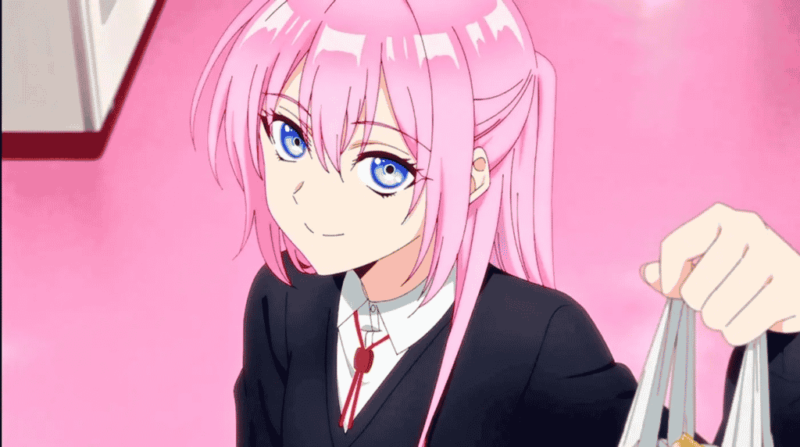
Shikimori’s Not Just a Cutie addresses interesting themes. Let’s get to them! But first, the summary for those who haven’t seen the anime yet. Not Just a Cutie follows the high school relationship between a boy named Izumi Yuu, who is cursed with bad luck–as in things-fall-and-try-to-kill-him bad luck, and Shikimori, who is an assertive and athletic girl. Their dating relationship is a healthy, mutually giving one. While they hesitate and get embarrassed about expressing their feelings for each other, they still express those feelings in many ways. It’s refreshing compared to the usual hide-your-feelings romantic-comedy. There’s also a good supporting cast who get a nice amount of focus.
Also my assessment: give it a watch.
Okay, let’s get to the themes which stood out to me.
Adversity is the Foundation for Virtue
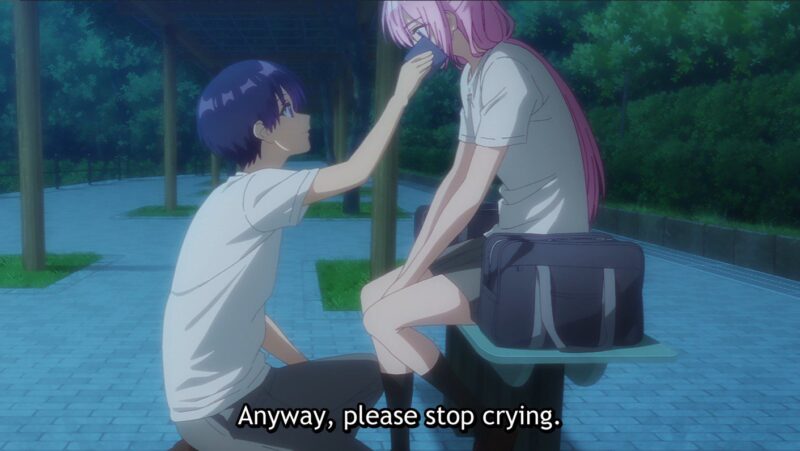
Not Just a Cutie embodies this Japanese proverb through Izumi and his family. Yes, parents are actually present and play a role in this high-school anime. Because of his bad-luck curse, Izumi often gets hurt and hurts those caught in the collateral damage. Yet, because of the problems he has faced, he is kind, compassionate, and helps others without asking for anything in return. The anime shows this early on and how he naturally follows these virtues. There’s also a flashback scene where Izumi prays in front of a shrine for either his bad-luck to go away or for the strength to endure. This channels a quote from Bruce Lee: “Do not pray for an easy life; pray for the strength to endure a difficult one.”
Izumi’s parents contribute to his virtue by being there to support him and Shikimori. They provide them with space to grow, yet are there to catch them both when they fall (in a literal way sometimes!). Shikimori’s family is more in the background than Izumi’s family, but they also support Shikimori in ways that are best for her personality. In order to grow in virtue amid adversity, you need a good support system.
Izumi has a quite sense of virtue to him, and this also appears in a surprising way. Later on, in the obligatory swimsuit episode, Shikimori gets a chance to show off the swimsuit she selected with Izumi in mind. While Izumi blushes a little when he compliments her (with a steady voice and without looking away, good man!), he focuses more on her thoughts and feelings than her appearance. Scenes like this, and many others, not only show the health of their relationship, but also the virtue Izumi had acquired through his problems growing up. However, this also plays into one of his insecurities.
Male Insecurities
Izumi’s bad luck and virtues combine into a common male insecurity. Namely, of not being worthy or good enough. Izumi wants to be strong and protect Shikimori as part of the usual male script. Males do have some, perhaps biological, need to protect and provide for those they love. Izumi does do that, just in a nonstandard way, but he cannot see that. Instead, he acknowledges how his cute, capable girlfriend is out of his league, yet he tries to make himself worthy of her. In fact, to his credit, he even discusses this insecurity with Shikimori. Her reaction is one of surprise and you-don’t-have-to-do that. While her response comes out of love, it only strengthens Izumi’s insecurity about his role as a man and within their relationship. Shikimori eventually sees this and works to support him in his growth. See what I mean about a healthy relationship? If you have to use an anime relationship as a role model, Izumi’s and Shikimori’s relationship is one of the best.
In any case, Izumi’s drive to improve himself endears him more to Shikimori, as does the way he pulls out her protectiveness. He doesn’t see this, of course. Males don’t see weaknesses as endearing– weakness is another male insecurity. Shikimori’s assertiveness, while welcomed by Izumi, makes him want to take charge more. To her credit, Shikimori allows him to at various times. Again, there’s a healthy give-and-take in their relationship.
External Validation
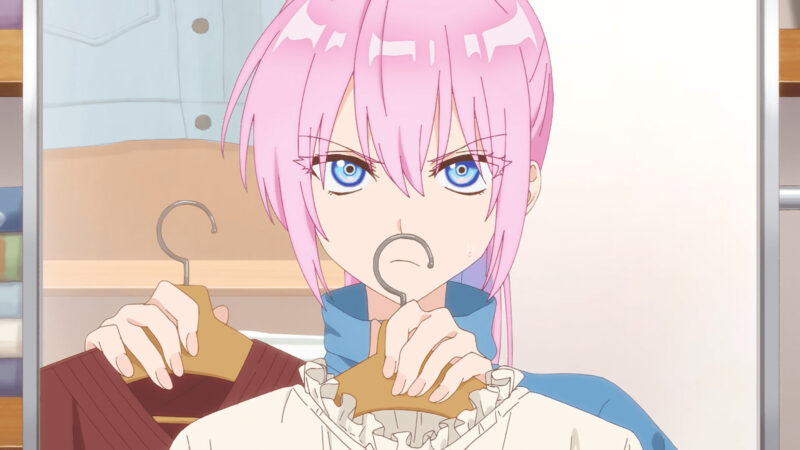
Shikimori struggles with external validation. Throughout the story,she’s concerned about what others think of her, especially her elder brother and Izumi. As a kid, she used to mimic her brother and seek his approval. When she starts to date Izumi, she adds his approval to her seeking list. Over time, Izumi’s acceptance of her and concern for what she wants (along with the guidance of her older brother) makes her seek her own internal validation more.
Everyone is susceptible to external validation seeking, but this only sets you up for pain and failure. While seeking it from those you love and trust is, to a degree, healthy, you have to learn to accept and seek your own inner validation first. Shikimori, over the course of the story, moves in this direction. Her brother plays the largest role in this, and his support for her relationship with Izumi is well played. Shikimori’s concern for external validation mirrors Izumi’s male insecurities. After all, Izumi wanting to follow the standard male script is a way to seek external validation. And just as Shikimori supports him, Izumi supports her by providing her a safe place to affirm her own growing inner validation.
The Difficulty of Love
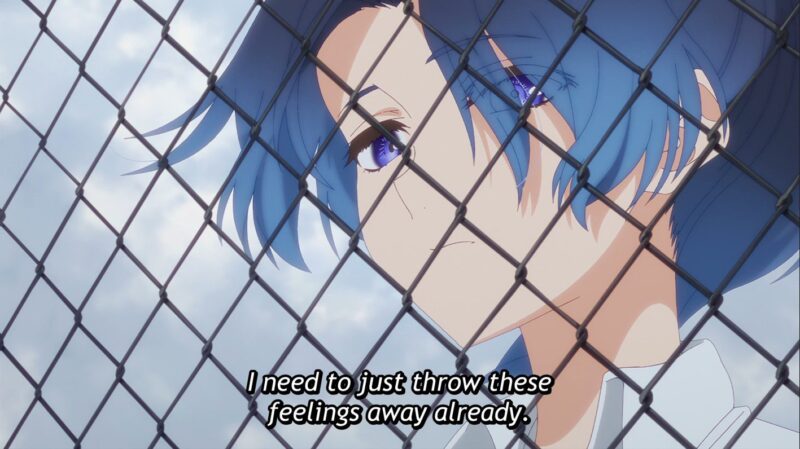
It’s difficult to discuss this theme without a bunch of spoilers. It centers around the supporting character Kamiya and her quiet pain at seeing Izumi’s and Shikimori’s relationship. She holds regrets and struggles with her status as the “cool, capable, popular” girl. Ironically, this status keeps her from establishing true connections that would allow her to take off her social mask. As you can guess, she has feelings for Izumi. An anime rom-com wouldn’t be one without a love triangle, so no real spoilers here. How that triangle plays out, on the other hand, reveals the difficulty of love when you feel as if you have to always hide your true self. This section also shows the depth of Shikimori’s character and virtue. I can’t discuss this theme further without spoiling it, but when you see this part of the story, you will understand.
As for the quality of the anime itself, it’s well done. The colors pop, especially the eyes of the characters. The anime uses these eyes to good effect to emphasize the emotions of the characters.
While Izumi and Shikimori come off as innocent, they don’t balk at speaking with each other about their difficulties. If I have to summarize this anime in a word: support. Everywhere you look, you see characters supporting each other. As I’ve mentioned, parents are even present and play a role. The story is grounded in realistic, every day difficulties, yet this makes the story even more engaging. Kamiya’s role also plays well into the over-arching theme. Few romantic comedy stories show this level of healthiness in relationships. While the story may feel dull for those used to more dramatic, unhealthy relationships, Shikimori is Not Just a Cutie offers a glimpse at what healthy relationships look like, and that is rare indeed in anime’s romantic comedy genre.
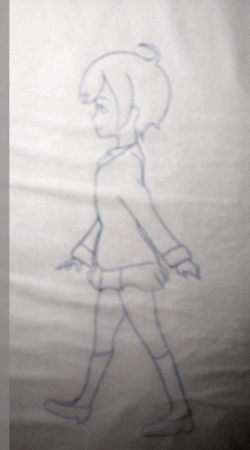
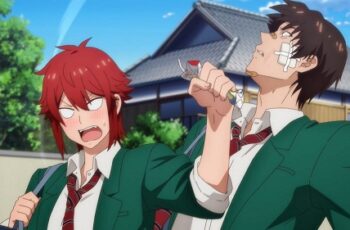


Shikomori is a very enjoyable series. I think the fact that all the drama is more internal and real-life doesn’t really get the attention of fans who just love the usual romantic tropes.
I enjoyed reading all of the manga so far and it’s charming. I love Hachimitsu. That’s my girl. 😛
Another great critique. The trope of a helpless anime male prevailing in love is not rare. However, the writers and directors do not emphasize Izumi’s curse to drive the story. That is what surprised me. I expected unrelenting slapstick, pratfalls and humiliation. I don’t remember cringing once. Everything you wrote is so very true, but the creators did something more by leaving out the clichés so that romantic relationship story would shine through.